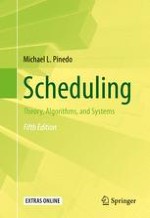
2016 | OriginalPaper | Buchkapitel
16. Modeling and Solving Scheduling Problems in Practice
verfasst von : Michael L. Pinedo
Erschienen in: Scheduling
Aktivieren Sie unsere intelligente Suche, um passende Fachinhalte oder Patente zu finden.
Wählen Sie Textabschnitte aus um mit Künstlicher Intelligenz passenden Patente zu finden. powered by
Markieren Sie Textabschnitte, um KI-gestützt weitere passende Inhalte zu finden. powered by